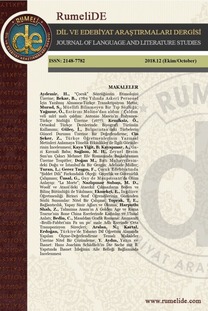Baudelaire'de Söylenin Söyleme Dönüşümü: Dionysos
Bu çalışmada Baudelaire'in (l'Ame du Vin) Şarabın Ruhu şiirinin bilişsel söylemi şarap tanrısı Dionysos söyleni temel alınarak değerlendirilecektir. Ozanın, söylen tanrısını konuşturarak, onun tüm birikimini insana yatıran öyküsünü şiirine konu edinerek, insanın yeryüzü serüvenini şarabın üretim serüveni üzerinden etkinleştirdiğine tanık oluyoruz. Ozan kendine özgü bir simgeleştirme ve tasarım anlayışıyla oluşturduğu şiirinde şarap söyleni üzerinden insana değgin tasarılarını şiirleştirme olanağı bulur. Şiirin öznesi şarap üzerinden insana yatırım yapan Dionysos'un sözleriyle ilerde bir kazanç sağlamak yönündeki (iyi) niyetini sezdirerek dizeleri gelecek zaman kipinde sözceliyor. Ozanın, söyleni farklı bir algılama düzlemine aktarmada, söylen bu yeni boyuta taşınırken derin ve yüzeysel yapıyı birbirine bağlayan dönüşüm işlemlerinde, söylen tanrısının yaratıcı edimlerine yerinde karşılıklar yükleyerek sözcelemesi, öncelikle bu, Baudelaire'e özel dilbilgisini ele almayı zorunlu kılıyor. Bu bağlamda şiir, söylenin insan bilişselliğindeki karşılıklarıyla örtüşmesi ve/veya örtüşmemesi dikkate alınarak irdelenecektir. İnsanı günlük telaşlarının, basit kaygılarının odağında sergileme, tanık olduğu durum ya da olayları söylene özgü sözvarlığıyla dile getirerek şiirleştirme anlayışı Baudelaire şiirinin bilişsel söylemini oluşturuyor. Bir ozan olarak o, duyarsız kitleyi daha çok insani değerler açısından değerlendirir ve tümüyle olumlu bir tasarım ilkesi üzerinde yoğunlaşarak şiirine taşıdığı bu bilişsel yapıyı, okurun bu konudaki önceki bilgilerini etkinleştirerek şarap göstereniyle bağdaşık eğretilemelerle şiirleştirir. Şiirde yatırımı önceleyen bir tasarım dizgesinden yararlanır ve bu şekilde söylen aracılığıyla asıl gerçeği buldurma ve eldeki verilerden olmayana ergi yöntemini yeğler, özetle Dionysos söyleni Baudelaire şiirinin söylemini oluşturuyor.
Transformation Of Myth Into Poetic Discourse In Baudelaire: Dionysos
In this study, the cognitive discourse of the poem Soul of the Wine (l'Ame du Vin) of Baudelaire will be examined in the framework of Dionysos's myth. We see that the poet tells the adventure of the humanity through the adventure of wine making by making the mythological god speak and using his story in the poem. The poet, with a sense of symbolization peculiar to him, finds the chance to include his ideas about the humans in his poems through the myth of wine. The subject of the poem utters the lines in the future tense with using the words of Dionysos and implicating his goodwill in terms of deriving benefits. Examining Baudelaire's special grammar becomes a requirement in transferring the myth into a different perception level and in these transferences which connect the deep and surface structures. In this context, the poem will be examined by taking into consideration whether the myth corresponds to its counterpart in the human cognition or not. The cognitive discourse of Baudelaire's poetry consists of depicting the human with his simple, everyday concerns or telling the situations and the events that he witnesses in the vocabulary of the myth. As a poet, he evaluates the insensitive masses in terms of the humanitarian values, he concentrates on total positive design principles and by activating the readers' prior knowledge, he writes his poems with metaphors coherent with the wine signifier. He prefers the method in which he makes the readers find the truth through myths by navigating them from the data available to unavailable. In conclusion, it can be said that the myth of Dionysos forms the poetic discourse of Baudelaire.
___
- Baudelaire, C. (2011). Les Fleurs du Mal. Paris: réimpression Éfélé de l'édition PouletMalassis et de Broise, 1861, BeQ, Kötülük Çiçekleri, Ahmet Necdet Çevirisi,2006, İstanbul: Dharma.
- Baudelaire, C. (2009). Le Spleen de Paris, Les Paradis artificiels. Bookking International, Les Fleurs du mal suivies du Spleen de Paris: Éditions de Clairefontaine, 1947, La Guilde du Livre, Lausanne. Introduction, éclaircissements et notes de Blaise Allan,
- BeQ, Jean-Yves Dupuis, Paris/ Paris Sıkıntısı (Tahsin YücelÇevirisi), 1984, İstanbul: Adam.
- Caron, J. (1983). Les Régulations du Discours, psycholinguistique et pragmatique du langage. Paris: PUF.
- Chevalier, J. & Gheerbrant, A. (1982). Dictionnaire des symboles. Paris: Editions Robert Laffont S.A et Editions Jupiter.
- Chomsky, N. (2001). Language and Mind. Third Edition, Cambridge University Press, (Dil ve Zihin, Ahmet Kocaman çevirisi) Ankara: Ayraç.
- Danon-Boileau, L. (2007). Le sujet de l'énonciation, Psychanalyse et linguistique, Réference et Enonciation, L'homme dans la Langue. Gap, Ophrys. Sözcelem Öznesi-Psikanaliz ve
- Dilbilim, Mehmet Baştürk çevirisi, Erzurum: Atatürk Üniversitesi Yayınları, 1998/ 2.Basım: Psikanaliz ve Dilbilim (Sözceleme Öznesi) Nisan. Ankara: De Ki Basım Yayım.
- David-Ménard, M. (2005). Deleuze et la psychanalyse, l'altercation. Paris: PUF.
- Doğan, M. N. (2008). Divan Şiirinde "Şarap" metaforları. İstanbul: Türk Dili ve Edebiyatı Dergisi, Sayı:38.
- Erhat, A. (1996). Mitoloji Sözlüğü. İstanbul: Remzi. Fink, G. (2010). Antik Mitolojide Kim Kimdir. Serpil Erfındık Yalçın (çev.) İzmir: İlya İzmir.
- Fontanier, P. (1977). Les Figures du discours, Introduction par Gérard Genette. Paris: Flammarion.
- Greimas, A, J. et Courtes, J. (1979). Sémiotique: Dictionnaire raisonné de la théorie du langage. Paris: Classiques Hachette.
- Greimas, A. (1972). Essais de sémiotique poétique. Paris: Larousse.
- Hamilton, E. (2004). Mitologya. Ülkü Tamer (Çev.) İstanbul: Varlık.
- İndirkaş, Z. (2012). Tanrının Maskesi ya da Maskenin Tanrısı. İstanbul: Tiyatro Dergisi, 335, sayı 5.
- Kristeva, J. (1974). La Révolution du langage poétique. Paris: Editions du Seuil.
- Le Nouveau Petit Robert (1993). Dictionnaire alphabétique et analogique de la langue
- française. Montréal, Canada. Saraç, T. (1989). Fransızca-Türkçe Büyük Sözlük. İstanbul: Adam.
- Todorov, T. (1979). Sémantique de la poésie. Paris: Editions du Seuil.
- Türk Dil Kurumu. (1983). Türkçe Sözlük. Ankara: TDK.
- Vardar, B., Güz N., Öztokat E., Senemoğlu O., Sözer E. (1988). Açıklamalı Dilbilim Terimleri Sözlüğü. İstanbul: ABC.
- Yalt, A. R. (1975). Fransızca-Türkçe Deyimler Sözlüğü, İstanbul: Remzi.
- ISSN: 2148-7782
- Yayın Aralığı: Yılda 6 Sayı
- Başlangıç: 2014
- Yayıncı: Yakup YILMAZ
Sayıdaki Diğer Makaleler
Alain Robbe-Grillet'nin Silgiler Romanında Zaman ve Mekân Sarmalları
Gideon Toury'nin Erek Odaklı Kuramı Işığında Bedrettin Tuncel'in İnsandan Kaçan Başlıklı Çevirisi
Moliere'in Cimri'sinin Çevirileri Üzerine Karşılaştırmalı Bir İnceleme
Claude Simon'un Gözünden Rusya Fragmanları: L'Invitation / Davet
Annie Ernaux'nun Les Annees'si: Otobiyografik Anlatıda Yeni Ufuklar
Baudelaire'de Söylenin Söyleme Dönüşümü: Dionysos
Patrick Modiano'nun Bir Gençlik Adlı Romanında Anlatının Yapısı
